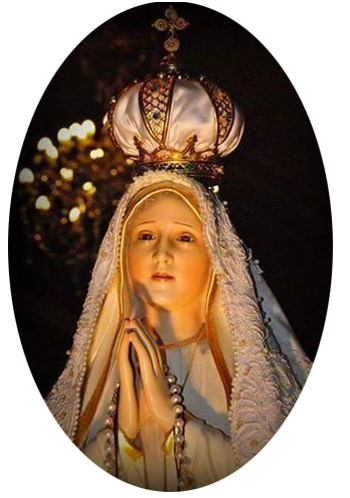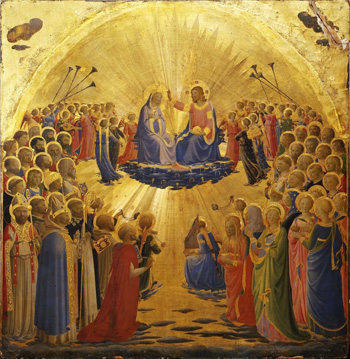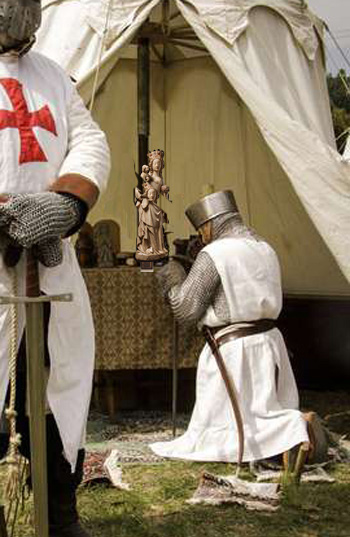Feast Days of Our Lady
 |
 |
 |
 |
 |
 |
 |
The Holy Name of Mary - September 12
Comments of Prof. Plinio:
In the past the name was considered a symbol of the person, hence in the old times initials were used, which were in some way the symbol of the name.
The name is the symbol of the psychological, moral and spiritual deeper reality of a person. For this reason the Most Holy Name of Our Lady – not to speak of the Most Holy Name of Jesus – must be considered as the symbol of her excellent virtue, her mission and what she truly is.
 The name of Our Lady is, therefore, the affirmation of her interior attributes and glory. For this reason the Name of Mary is the symbolic manifestation of all that is excellent in Our Lady. By celebrating this day, we commemorate the glory that Our Lady had, has and will have in Heaven, on earth and in the whole universe.
The name of Our Lady is, therefore, the affirmation of her interior attributes and glory. For this reason the Name of Mary is the symbolic manifestation of all that is excellent in Our Lady. By celebrating this day, we commemorate the glory that Our Lady had, has and will have in Heaven, on earth and in the whole universe.
As for her glory in Heaven, she is the Queen of all the Angels and all the Saints, placed incomparably and immeasurably above all creatures. In the created order she is, so to speak, the very apex of the cone toward which everything converges. She is, thus, our Mediatrix before God Our Lord. The glory she has with this role is beyond words since it is a consequence of her condition of being the Mother of the Savior, Our Lord Jesus Christ.
As for her glory on earth – we need to think a lot about this – here also she must also be glorified. Regarding God, we pray: Gloria Patri, et Filio et Spiritui Sancto; Sicut erat in principio, et nunc et simper, et in saecula saeculorun; Amen – as it was in the beginning, is now and forever shall be forever and ever. Amen. It would be normal and appropriate for the Most Holy Name of Our Lady to be glorified also in an inexpressible way.
You may imagine a Christendom where the spirit of St. Louis Grignion of Montfort was everywhere present. Imagine if throughout the earth the disciples of St. Louis of Montfort were the salt of the earth and would give the tonus of piety for Our Lady; then you may understand how the glory given to Our Lady would be incomparably greater than it is today.
 Until the moment when Progressivism took over the Church, we saw Our Lady receive much glory from the Church. That glory appeared immense to us, but it was nothing in comparison to the glory she would have been given had the spirit of St. Louis Grignion of Montfort been dominant in society. This is the glory that we should ardently aspire to give Our Lady.
Until the moment when Progressivism took over the Church, we saw Our Lady receive much glory from the Church. That glory appeared immense to us, but it was nothing in comparison to the glory she would have been given had the spirit of St. Louis Grignion of Montfort been dominant in society. This is the glory that we should ardently aspire to give Our Lady.
It is hateful and odious that vice, crime, the Revolution and the Devil have been able to diminish the glory that she should receive from men. How can we have well-being on earth when the glory, the honor and the attention due to Our Mother are denied to her? This should be for us a continuous cause for indignation. Indignation to see that the Queen is not being recognized by all in the role she must have on earth.
Let us pray to Our Lady to accept our redresses for the outrages continuously made against her. Let us ask her to prepare our souls to make a complete reparation for these outrages. We should make an examination of conscience to see whether our reparation is what it should be, and to examine whether we should make reparation for the deficiency of our reparation.
 This is a point upon which we should think. We cannot ask Our Lady to forgive what others have done – as if we were without guilt – without first asking her forgiveness for what we have also done. Thus, we should ask her to accept our reparation for the weak reparation that we have poorly offered to her.
This is a point upon which we should think. We cannot ask Our Lady to forgive what others have done – as if we were without guilt – without first asking her forgiveness for what we have also done. Thus, we should ask her to accept our reparation for the weak reparation that we have poorly offered to her.
How should this perfect reparation be? It should be the consequence of a full love, a complete notion of everything that Our Lady represents, of everything that she is. It is not only a theoretical notion, but a practical, living and concrete notion.
Then, as we work throughout the day, we should ask ourselves whether the zeal for the glory of God and the glory of Our Lady truly devours us, or are we more consumed by matters of self-love, self-interest and personal sensitivities, thus curbing the zeal we should have for Our Lady. Because if these defects interfere and we think more about ourselves than about her, then our reparation is not as complete as it should be.
Once again, here arises the opportunity for us to have recourse to our Guardian Angels and our Protector Saints, asking them to unite with us in order to give our reparation a value that per se it lacks, so that it might be an acceptable, honorable and satisfactory reparation.
I have a great hope that, if we bring these dispositions before an altar of Our Lady, she will grant us abundant graces and she will receive, if not our reparation, at least our humility. And it is this humility that we can bring to place at her feet.

The Saint of the Day features highlights from the lives of saints based on comments made by the late Prof. Plinio Corrêa de Oliveira. Following the example of St. John Bosco who used to make similar talks for the boys of his College, each evening it was Prof. Plinio’s custom to make a short commentary on the lives of the next day’s saint in a meeting for youth in order to encourage them in the practice of virtue and love for the Catholic Church. TIA thought that its readers could profit from these valuable commentaries.
The texts of both the biographical data and the comments come from personal notes taken by Atila S. Guimarães from 1964 to 1995. Given the fact that the source is a personal notebook, it is possible that at times the biographic notes transcribed here will not rigorously follow the original text read by Prof. Plinio. The commentaries have also been adapted and translated for TIA’s site.
In the past the name was considered a symbol of the person, hence in the old times initials were used, which were in some way the symbol of the name.
The name is the symbol of the psychological, moral and spiritual deeper reality of a person. For this reason the Most Holy Name of Our Lady – not to speak of the Most Holy Name of Jesus – must be considered as the symbol of her excellent virtue, her mission and what she truly is.

The Name of Mary representas the excellence
of all her virtues
As for her glory in Heaven, she is the Queen of all the Angels and all the Saints, placed incomparably and immeasurably above all creatures. In the created order she is, so to speak, the very apex of the cone toward which everything converges. She is, thus, our Mediatrix before God Our Lord. The glory she has with this role is beyond words since it is a consequence of her condition of being the Mother of the Savior, Our Lord Jesus Christ.
As for her glory on earth – we need to think a lot about this – here also she must also be glorified. Regarding God, we pray: Gloria Patri, et Filio et Spiritui Sancto; Sicut erat in principio, et nunc et simper, et in saecula saeculorun; Amen – as it was in the beginning, is now and forever shall be forever and ever. Amen. It would be normal and appropriate for the Most Holy Name of Our Lady to be glorified also in an inexpressible way.
You may imagine a Christendom where the spirit of St. Louis Grignion of Montfort was everywhere present. Imagine if throughout the earth the disciples of St. Louis of Montfort were the salt of the earth and would give the tonus of piety for Our Lady; then you may understand how the glory given to Our Lady would be incomparably greater than it is today.

Our Lady should receive her due glory on earth
as well as in Heaven
It is hateful and odious that vice, crime, the Revolution and the Devil have been able to diminish the glory that she should receive from men. How can we have well-being on earth when the glory, the honor and the attention due to Our Mother are denied to her? This should be for us a continuous cause for indignation. Indignation to see that the Queen is not being recognized by all in the role she must have on earth.
Let us pray to Our Lady to accept our redresses for the outrages continuously made against her. Let us ask her to prepare our souls to make a complete reparation for these outrages. We should make an examination of conscience to see whether our reparation is what it should be, and to examine whether we should make reparation for the deficiency of our reparation.

We should bring our reparation before her altar
How should this perfect reparation be? It should be the consequence of a full love, a complete notion of everything that Our Lady represents, of everything that she is. It is not only a theoretical notion, but a practical, living and concrete notion.
Then, as we work throughout the day, we should ask ourselves whether the zeal for the glory of God and the glory of Our Lady truly devours us, or are we more consumed by matters of self-love, self-interest and personal sensitivities, thus curbing the zeal we should have for Our Lady. Because if these defects interfere and we think more about ourselves than about her, then our reparation is not as complete as it should be.
Once again, here arises the opportunity for us to have recourse to our Guardian Angels and our Protector Saints, asking them to unite with us in order to give our reparation a value that per se it lacks, so that it might be an acceptable, honorable and satisfactory reparation.
I have a great hope that, if we bring these dispositions before an altar of Our Lady, she will grant us abundant graces and she will receive, if not our reparation, at least our humility. And it is this humility that we can bring to place at her feet.
 | |
|
|
The texts of both the biographical data and the comments come from personal notes taken by Atila S. Guimarães from 1964 to 1995. Given the fact that the source is a personal notebook, it is possible that at times the biographic notes transcribed here will not rigorously follow the original text read by Prof. Plinio. The commentaries have also been adapted and translated for TIA’s site.